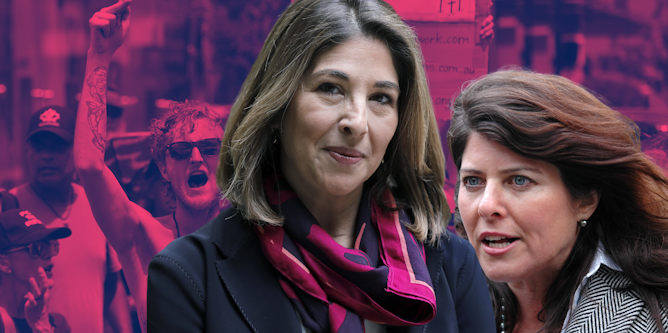|
With the Voice to Parliament referendum now just over a month away, The Conversation is publishing a fortnightly series of analysis looking at the messaging, media coverage, social media presence and polling numbers for both the “yes” and “no” campaigns.
In the second instalment of the series, La Trobe University political communication expert Andrea Carson, along with co-authors Simon Jackman and Rebecca Strating, look at how the “no” campaign has been dominating one social media site in particular – TikTok.
TikTok is hugely popular with people under the age of 34, which the “no” side has recognised and is using to its advantage, the authors write.
Videos produced by the Fair Australia campaign have garnered more than 860,000 likes since the group started posting to TikTok this year – far more than the 92,000 likes combined for the accounts of the two main “yes” campaigns.
While engagement does not necessarily impact voter behaviour, Fair Australia’s strategy is a direct attempt to influence younger voters who are more likely to vote “yes”.
Not only is Fair Australia relying on a large volume of videos to attract an audience, the authors cite three other key elements: authenticity (by prioritising Indigenous “no” supporters), the use of personal narratives and humour.
This, they contend, is getting noticed (and liked) by a social media-savvy youth audience who could be key in the referendum.
|

|
Justin Bergman
Senior Deputy Politics + Society Editor
|
|

Andrea Carson, La Trobe University; Rebecca Strating, La Trobe University; Simon Jackman, University of Sydney
The ‘no’ side is successfully engaging young people on TikTok by combining volume (posting multiple TikToks a day) with authenticity, use of personal narratives and humour.
|

Dee Ninis, Monash University; Ryan Hoult, Université catholique de Louvain (UCLouvain)
Cities and towns have been devastated by the impact of the 6.8 magnitude quake – the largest recorded in the country’s history.
|

Michelle Grattan, University of Canberra
After months of stalling, the Greens agreed to pass the legislation through the Senate this week, despite the government refusing to give ground on its demand for controls on rents.
|

Ian Douglas, UNSW Sydney; Seena Sarram, UNSW Sydney
The US has open-skies agreements with more than 100 nations, Singapore has more than 60 nations. Australia has just seven.
|

Erica Mealy, University of the Sunshine Coast
Google is paving the way to serve you ads based directly on your browsing history, instead of cookies.
|

Josephine Chau, Macquarie University
Many workplaces have adopted sit-stand desks, which allow you to sit down or stand up with the push of a button, to reduce the risks of prolonged sitting. But is standing better for your health?
|

Marg Rogers, University of New England; Cassy Dittman, CQUniversity Australia; Govind Krishnamoorthy, University of Southern Queensland
Grumbling children and teenagers can be so annoying. But it is important to try and decode their complaints.
|

David M Watson, Charles Sturt University; Rodney van der Ree, The University of Melbourne
Mistletoes are ecological keystones that boost habitat value for wildlife, so we added them to established plane trees in the inner city.
|

Nick Haslam, The University of Melbourne
Naomi Klein uses her frequent confusion with ‘doppelganger’ Naomi Wolf to spark an exploration of doubles, mirror-worlds, and the gulf between left and right.
|
Politics + Society
|
-
Susan St John, University of Auckland
Both major parties are promising to increase payments for families ‘in work’. But the changes will only entrench the problems already faced by beneficiaries and the working poor.
-
Adrian Beaumont, The University of Melbourne
As support for the Voice continues to slide, voters are turning away from the Albanese government too.
-
Richard Buning, The University of Queensland; Wendy Pham, The University of Queensland
Brisbane was the first Australian city to accept rideshare e-scooters. After some growing pains, residents, visitors and the city itself are enjoying the benefits, a new study finds.
|
|
Health + Medicine
|
-
Rachael Jefferson-Buchanan, Charles Sturt University
The BMI does not distinguish between excess body fat, bone mass or musculature. It also does not interpret the distribution of fat, which is a predictor of health.
|
|
Science + Technology
|
-
Colin Klein, Australian National University
The science of human consciousness offers new ways of gauging machine minds – and suggests there’s no obvious reason computers can’t develop awareness.
|
|
Environment + Energy
|
-
Roger Jones, Victoria University
Most fire climate regimes in Australia shifted abruptly around the year 2000 – greatly increasing fire risk.
|
|
Arts + Culture
|
-
Huw Griffiths, University of Sydney
Oscar Wilde’s extraordinary script is delivered with sharp wit by an extraordinary cast and placed within a production that exploits the dialogue for its viciously comic potential.
-
Jane Simon, Macquarie University
For Zoe Leonard, photography is not just about using a camera. Photography is also about a way of thinking, seeing and interacting.
|
|
Books + Ideas
|
-
Stuart Kells, La Trobe University
An irresistible history of the OED reveals that English is a global language in its sources, its reach and its ownership.
|
|
| |
|
|
|
Auckland University of Technology
Auckland, New Zealand
•
Full Time
|

|
|
Auckland University of Technology
Auckland, New Zealand
•
Full Time
|

|
|
|
|
| |
| |

|
| |
| |
| |
Featured Events, Courses & Podcasts
|
View all
|
|
1 January 2023 - 7 October 2026
•
|

|
6 July - 6 October 2023
•
|

|
15 - 17 September 2023
•
Sydney
|

|
13 September - 11 October 2023
•
Melbourne
|

|
|
|
|
| |
| |
| |
| |
| |
|
|